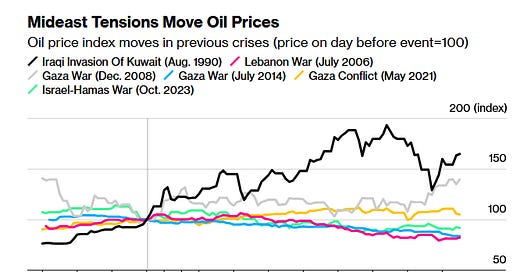Will the IDF attack Iranian oil fields?
If they do, Iran is permanently weakened and energy investors cheer
The problem in the middle East has its roots in Iran, not in Israel. Israel is not free of blame, and the brutality of its treatment of Palestinians has the Muslim world including Muslims in Europe and North America taking to the streets in massive protests in support of Hamas and Hezbollah and calling for the destruction of the State of Israel.
Caught in the middle a month from a Presidential election is Kamala Harris who can’t decide much of anything and certainly not how to deal with a thorny foreign policy issue. Donald Trump has no such ambivalence - he encourages Israel to put and end to the Iranian efforts to destroy Israel (both directly and through its proxies) and sees attacks on Iran as weakening an emerging nuclear power that is a threat to world order and American interests.
Trump doesn’t worry about the effect an attack on Iran’s oil industry will have on world oil prices since if elected he will encourage U.S. production to rise materially and offset the decline in output from Iran over a relatively short few years. But in the meantime, the elimination of Iran’s production is likely to drive oil prices much higher, as happened in the Iraqi invasion of Kuwait in the summer of 1990.
Trump’s views are soundly based. There is no shortage of oil and the U.S. is now the leading world oil producer. Increasing U.S. output will generate positive results in U.S. economic growth, balance of trade, and government revenues. While the left promotes the silly theory that CO2 causes climate change, a physical impossibility, Trump has no such delusion and calls the theory the hoax that it is. Americans are waking up to reality that the Democrats have fed them a bill of goods for decades. Climate change is no longer a major issue for U.S. voters, but the economy is number one.
Harris remains a popular candidate. Her popularity in part is because she is Black, a woman, and will say anything that advances her claim on the White House regardless of her past statements that often contradict her campaign promises. Trump is often pilloried for lies and half truths, deservedly in many cases, but Harris takes the prize for the least reliable promises. Trump made promises in his 2016 election campaign and when elected President he kept them (or at least tried to when not bridled by Congress). Harris makes promises she neither intends to keep nor has the ability to enact unless Democrats win both houses of Congress as well as the Presidency.
Turmoil in the middle-East is becoming a key election issue, at least indirectly to the extent it affects oil prices, the world economy, and U.S. foreign policy. Trump has landed on the right side of the street on this issue and it will help him in his bid to win on November 5.





There is plenty of spare capacity for oil.
The whole situation would blow over in less time than you could imagine - PROVIDED no one comes to Iran's assistance or bolster their supplies.
The EXPECTATION, is that Israel will NOT attack oil infrastructure, to avoid irritating their allies - opting instead to focus on refining & products to have a more direct effect on only the Iranian economy.
The EXPECTATION, is that Israel will NOT hit anything (including nuclear facilities), this side of the US election.
Therefore, I don't think it is unreasonable to suggest that the OPPOSITE might happen for both, and much sooner.
The real problems would begin, IF, one of our enemies saw an escalation in the Middle East as an opportunity in some other part of the world whilst we were all distracted?
What will happen if Iran, with the Houthis help, closes the Straits of Hormuz, and no oil tankers can pass?
Won't there be quite some shortages, and prices will rise a lot?